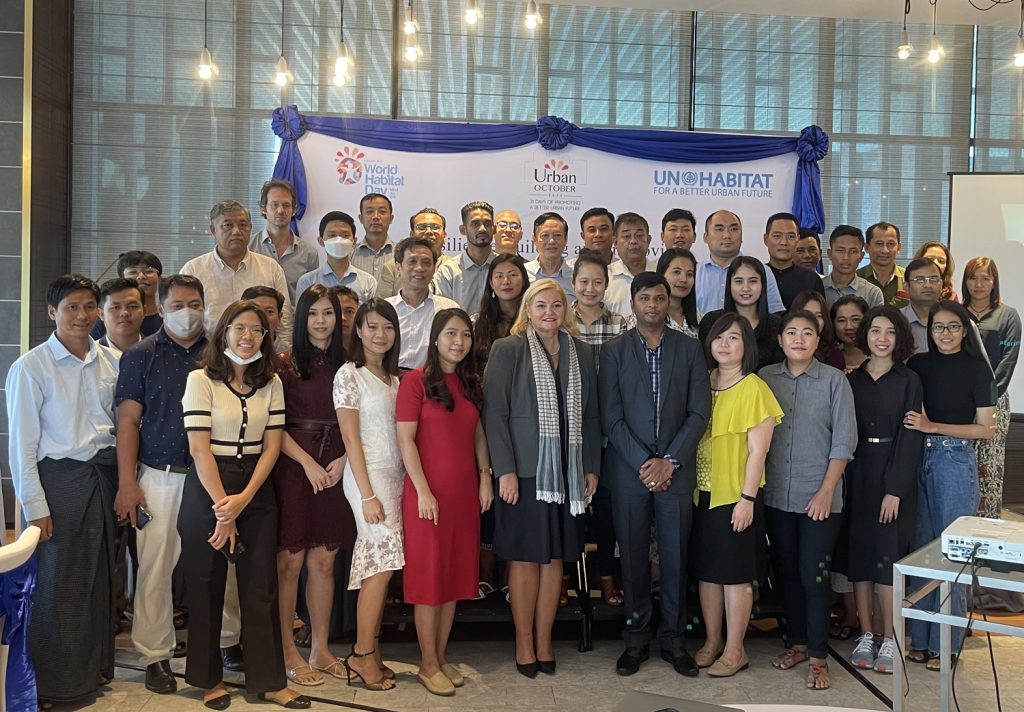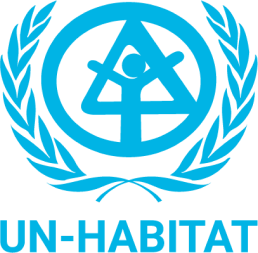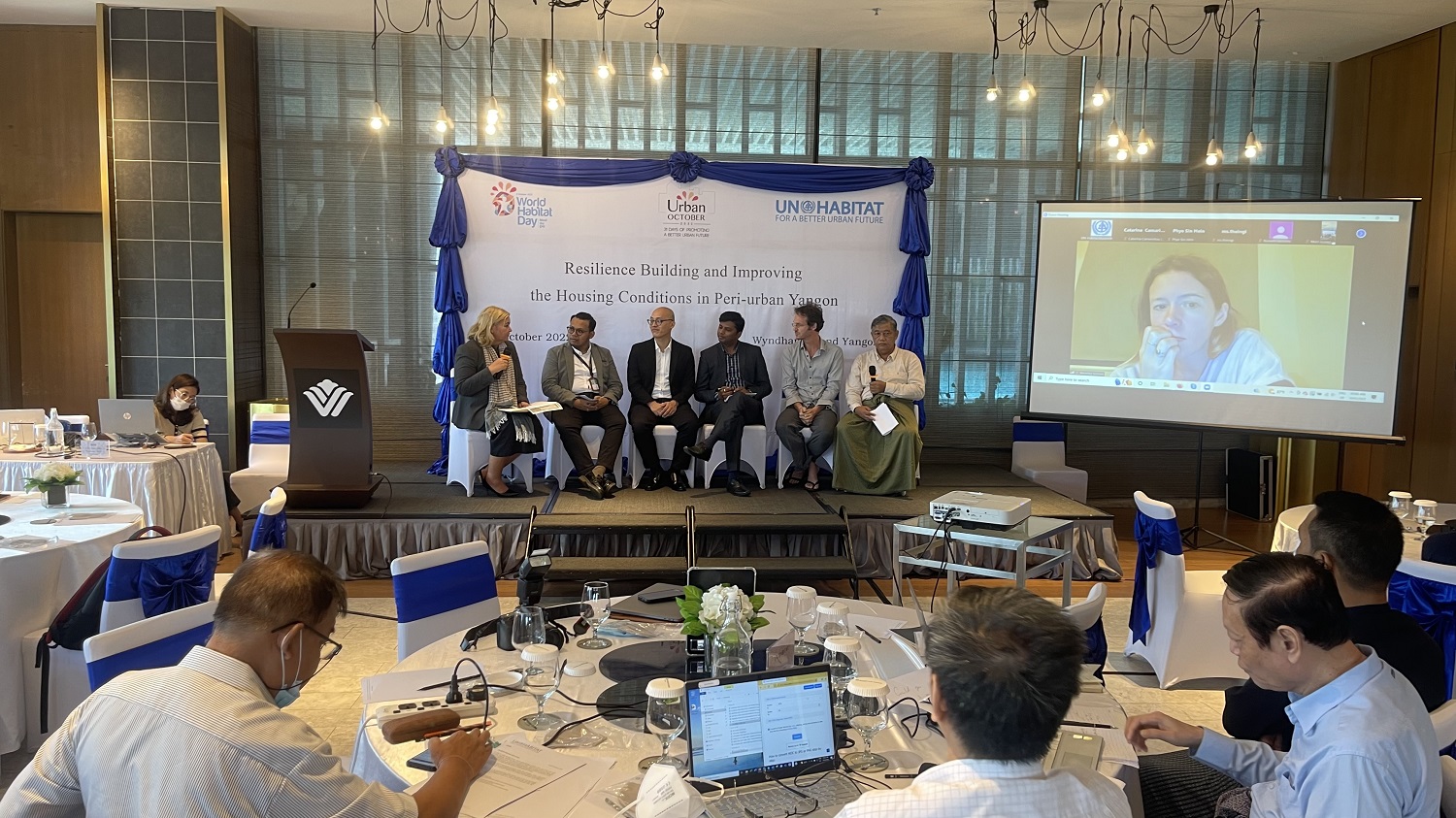Yangon, Myanmar, 17 October 2022 – A home is not just a roof over one’s head; it needs to be safe, secure, and resilient. Adequate housing provides people with dignity and the opportunity to lead a normal life. According to a recent survey of informal settlements in Dagon Seikkan conducted in collaboration with Doh Eain, residents in the informal settlements are extremely vulnerable and have very low income, and people living in those areas prioritize food, water, electricity, healthcare, and education, all of which are basic services and basic human rights that people in informal settlements deserve. However, housing and living conditions are poor; there is no municipal system, so people need to buy water from local vendors to use for drinking, washing, and cooking; sanitation practices are inadequate, resulting in an unhealthy scenario; and electricity is limited.
As part of the Urban October activities, UN-Habitat Myanmar organized a hybrid panel discussion on “Resilience Building and Improving the Housing Conditions in Peri-urban Yangon” on 5 October 2022. Over 50 participants—online and offline—from different NGOs and UN agencies attended the event.
The event began with a video message from Ms. Maimunah Mohd Sharif, the Executive Director of UN-Habitat, who stated: “Today we are witnessing the emergence of newly poor people—those of us who have fallen into poverty due to the four Cs: Covid-19, Climate Change, Conflict Crisis and Capital. {…) There is not much time left until 2030. We need to act now and make our cities truly inclusive places so that no one and no place is left behind.”
The ED’s video was followed by presentations on ongoing UN-Habitat projects in peri-urban Yangon, in collaboration with Doh Eain and Thant Myanmar. Presenters mainly discussed the methodology, approaches, and key achievements in housing development; WASH infrastructure and basic services provision; and behavioral change communication in hygiene and sanitation practices. The socioeconomic impacts of COVID-19 in Yangon’s informal settlements were also addressed by the presenters.

Dr. Catarina Camarinhas, Country Programme Manager a.i. of UN-Habitat, moderated the panel discussion, while senior officials from UN-Habitat Myanmar, Doh Eain, and Thant Myanmar participated as panel members. The main discussion topics were: 1) how to address inequalities and hear the silenced experiences of the marginalized; and 2) how to foster the use of traditional knowledge and raise the voices of those who have been the most left behind, including innovative financing for sustainable local development.
Doh Eain introduced their approach to community engagement in program design, need assessments, and surveying to build trust within the target communities. Capacity development is provided to local workers and community members, making use of the skills available within the community, embracing their culture, understanding their demographics, and giving them ownership of the project. Doh Eain also uses innovative open-source technology for data collection and analysis.
UN-Habitat considered the importance of traditional and sustainable construction techniques and local materials such as bamboo in sustainable urban development, in order to reduce energy consumption, waste, and promote resilience at local level. UN-Habitat also referred to the People’s Process approach, involving communities in designing, mapping, planning, implementation, monitoring, and evaluation, giving them a sense of ownership and leading to sustainable development. Members of the Community Development Committees are chosen by the community. The community determines the criteria, and selects the beneficiaries.
As part of the efforts to promote environmental conservation and waste management, Thant Myanmar explained the waste collection and composting awareness training, with a focus on reducing, reusing, and recycling. They avoid providing direct community incentives, thereby creating opportunities for the community to sustainably continue to practice waste management. Engagement methods include reaching out informally through ‘pop‑up’ community awareness sessions held impromptu at the places most frequented by the population.
A design and resilience toolkit targeting residents of informal settlements was also introduced during the session, focusing on housing improvements, rainwater harvesting and sanitation. The toolkit is available in Myanmar language and English.
Urban October is an annual opportunity to generate and support activities linked to sustainable urbanization and SDG 11: “to make cities inclusive, safe, resilient and sustainable”. This year’s Urban October theme “Mind the Gap. Leave No One and No Place Behind” puts the spotlight on the widening of inequalities in living conditions across the world. A cascade of challenges – from climate chaos and conflicts to COVID-19 – is hitting the most vulnerable populations the hardest. Conditions exacerbated by the COVID-19 pandemic have highlighted the need for comprehensive programs that address the multidimensional vulnerabilities affecting the population living in informal settlements.
Moderator: Catarina Teles Camarinhas, Country Programme Manager ai, UN-Habitat
Panel members: Beverly Salmon, Deputy Director, Doh Eain
Tun Ye Wai, Senior Project Architect, Doh Eain
Friedor Jeske, Program Director, Thant Myanmar
Shashank Mishra, Programme Specialist, UN-Habitat
Jun Fujihira, Programme Officer, UN-Habitat
Aye Cho, Senior community mobilizer, UN-Habitat


